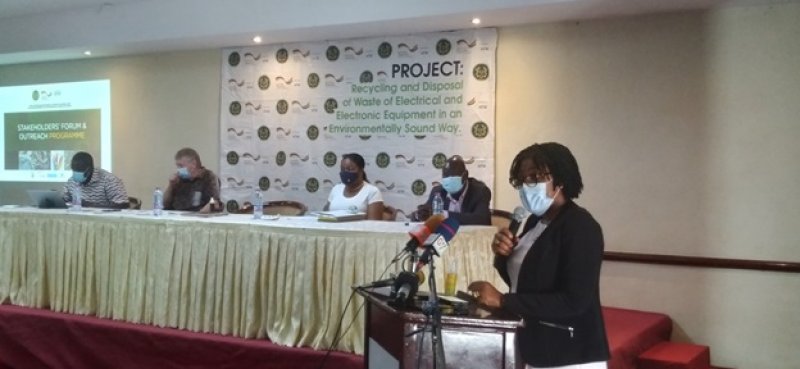
Audio By Carbonatix
The Ministry of Environment, Science, Technology and Innovation has engaged key stakeholders within the electronic waste (e-waste) value chain on the implementation of a project aimed at managing the disposal of e-waste in a sound environment in Kumasi.
The project, which is also seeking to minimize negative environmental and human health impacts from improper management of e-waste, is a collaboration between the Ministry and the German Government through KFW.
Representatives from scrap dealers associations, electronic repairers, environmental health officers, waste management companies, and the Environmental Protection Agency (EPA) attended the forum.
It was to raise awareness of the project and to get the concerns of the participants to help inform policy and project implementation.
Under the 20-million Euro project, which started in 2018, the German government is supporting Ghana to set up an incentive mechanism for the sound collection, dismantling, recycling, and disposal of e-waste.
Consequently, a Handover Centre has been established in Accra to purchase e-waste from scrap collectors at a fee slightly above the market value as an incentive to halt the burning of e-waste to obtain copper.
The Chief Director of the Ministry, Mrs. Cynthia Asare Bediako, in a speech read on her behalf, said the project was modeled to align with provisions of Act 917 and provided the government the opportunity of identifying challenges and lessons learnt to improve upon national systems once it fully took off.
According to her, over 50 tonnes of e-waste cables were purchased by the Handover Centre at Agbogloshie since the incentive payment system was launched in June, last year.
“The project hopes by mid-April 2021, to commence the purchase of mixed batteries at Agbogbloshie. These e-waste fractions when collected will be offloaded to licensed recycling companies to handle them in an environmentally sound manner”, she stated.
She said it was important to sensitize all stakeholders on the Regulatory Framework on e-waste management in Ghana and outline the roles each of them could play for a successful implementation of the project.
The Director, Policy Planning, Monitoring and Evaluation, and the Project Coordinator, Mrs. Lydia Essuah, said Ghana’s e-waste management was largely controlled by the informal sector with close to 97 percent dominance.
She said they employed crude, rude and unconventional methods to recover the valuable component and indiscriminately disposed of the hazardous component at the detriment of the environment and human health.
The current system, she said, was not sustainable and that was why the government has taken steps including policy direction, legislation, business models, and funding to address the problem.
Latest Stories
-
Ghana is rising again – Mahama declares
4 hours -
Firefighters subdue blaze at Accra’s Tudu, officials warn of busy fire season ahead
5 hours -
New Year’s Luv FM Family Party in the park ends in grand style at Rattray park
5 hours -
Mahama targets digital schools, universal healthcare, and food self-sufficiency in 2026
5 hours -
Ghana’s global image boosted by our world-acclaimed reset agenda – Mahama
5 hours -
Full text: Mahama’s New Year message to the nation
5 hours -
The foundation is laid; now we accelerate and expand in 2026 – Mahama
6 hours -
There is no NPP, CPP nor NDC Ghana, only one Ghana – Mahama
6 hours -
Eduwatch praises education financing gains but warns delays, teacher gaps could derail reforms
6 hours -
Kusaal Wikimedians take local language online in 14-day digital campaign
7 hours -
Stop interfering in each other’s roles – Bole-Bamboi MP appeals to traditional rulers for peace
7 hours -
Playback: President Mahama addresses the nation in New Year message
8 hours -
Industrial and Commercial Workers’ Union call for strong work ethics, economic participation in 2026 new year message
9 hours -
Crossover Joy: Churches in Ghana welcome 2026 with fire and faith
9 hours -
Traffic chaos on Accra–Kumasi Highway leaves hundreds stranded as diversions gridlock
10 hours

